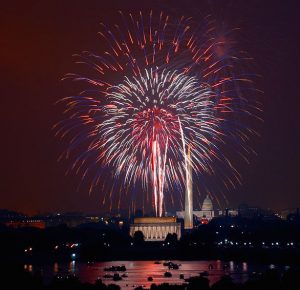Is it just me, or does it seem like the fireworks season has begun much sooner than the July 4 holiday? Not one to be a fireworks snob who has been known to partake in such celebration over the years, going way back to my pre-teen days, but I have been listening to fireworks go off every night for the last two weeks.
One night last week at 11:30 p.m., I was awakened by fireworks going off in a nearby church parking lot — and that’s where I start to draw the line. My first instinct was to pull out the extra laser rifle scope and start pointing it in their direction. But then I realized that I was standing in my underwear on my back deck and recognized it probably wasn’t the best plan.
So I instead yelled out at a big “Hey!” hoping to scare them away. It worked as they scattered like flies and hopped back in their cars and drove off.
We were all kids, and people my age can sometimes forget how it was, and besides what was I doing going to bed before 11 p.m. anyway, right?
Today as a risk management and safety consultant, I can still remember my in discretional teenage years engaging in some pretty risky behavior of shooting roman candles and bottle rockets at one another. Or lighting firecrackers on the doorsteps of neighbors we didn’t like in the evening hours. To protect the identity of those hoodlums, I will not name names, but you know who you are.
According to the American Pyrotechnics Association (APA) consumption of fireworks in the United States has risen dramatically during the past four decades, from 29 million pounds in 1976 to over 277.5 million pounds in 2018. For 2019 Fireworks sales to top $1.3 billion and most of those sales occur those few weeks before the July 4 holiday.
Fireworks have become a staple for July 4 celebrations and they have grown in popularity at sporting events, entertainment parks, and other outdoor venues. For instance, Disney Parks spend more than $50 million a year on fireworks and pyrotechnic effects.
The main reason why sales are growing is because more states now allow them. Massachusetts is the only state to still ban all fireworks sales. In fact since 2011, 11 states — Kentucky, Utah, New Hampshire, Michigan, New York, Georgia, West Virginia, Iowa, New Jersey, Pennsylvania, and Delaware — have lifted restrictions on the sale of certain types of consumer fireworks.
So, why the increase, you ask? To answer that question all you have to do is follow the money, and it’s to gain the tax revenues for many of these cash-strapped states.
But how safe are fireworks? According to the U.S. Consumer Product Safety Commission, there were an estimated 9,100 fireworks-related injuries treated in U.S. emergency rooms in 2018; and of these, about 5,600 occurred in the one month around July 4 (from June 22 to July 22). Many of the injuries result in burns, and they also include permanent scarring and blindness, and in 2018, at least five people died from fireworks.
Serious misuse of fireworks devices, as well as the use of illegal explosives, account for a large proportion of these fireworks-related injuries. In an effort to counter misuse, the fireworks industry has stepped up its efforts to inform and educate the public on the dangers of illegal explosives and the need to observe all safety precautions when using backyard fireworks.
During this period of unprecedented growth, fireworks injuries have declined dramatically due to industry safety education efforts and the ever-improving quality of its products. Over the most recent decade, this downward injury trend continues even as an increasing number of states and municipalities have relaxed their consumer fireworks laws – in fact, the injury rate was almost 56 percent lower in 2018 compared to 2000.
So if you are planning to host a Fourth of July party this year that involves dazzling your friends and neighbors with fireworks, you should check with your insurance agent and local and state laws before breaking out the good stuff.
First, make certain you are obeying local laws (cough, cough), but if you choose to ignore them, make sure that you still call your insurance agent on your home owner’s policy to confirm coverage in the event of a fireworks-related accident. Some insurance policies have been known to exclude coverage in the event of acts from the use of illegal fireworks.
In many Kentucky towns and cities, all aerial and audible ground devices, such as bottle rockets and firecrackers, are prohibited. But the odds of you being arrested for this offense are highly unlikely. You are more likely to get charged with not wearing a face mask during this COVID-19 pandemic than you would be for breaking your community fireworks laws.
 Keven Moore works in risk management services. He has a bachelor’s degree from the University of Kentucky, a master’s from Eastern Kentucky University and 25-plus years of experience in the safety and insurance profession. He is also an expert witness. He lives in Lexington with his family and works out of both Lexington and Northern Kentucky. Keven can be reached at kmoore@roeding.com
Keven Moore works in risk management services. He has a bachelor’s degree from the University of Kentucky, a master’s from Eastern Kentucky University and 25-plus years of experience in the safety and insurance profession. He is also an expert witness. He lives in Lexington with his family and works out of both Lexington and Northern Kentucky. Keven can be reached at kmoore@roeding.com
To safely assist you with pyro-manic behaviors, here are a few safety tips to prevent an accident from occurring:
• Obey all local laws regarding the use of fireworks.
• Know your fireworks; read the cautionary labels and performance descriptions before igniting.
• A responsible adult should supervise all firework activities. Never give fireworks to children.
• Alcohol and fireworks do not mix. Save your alcohol for after the show.
• Use a sober designated fireworks l shooter.
• Wear safety glasses when shooting fireworks.
• Use a flat, hard surface like a driveway. Avoid lighting fireworks on grass or in containers.
• Light one firework at a time and then quickly move away.
• Use fireworks outdoors in a clear area; away from buildings and vehicles.
• Never relight a “dud” firework. Wait 20 minutes and then soak it in a bucket of water.
• Always have a bucket of water and charged water hose nearby.
• Never carry fireworks in your pocket or shoot them into metal or glass containers.
• Do not experiment with homemade fireworks.
• Dispose of spent fireworks by wetting them down and place in a metal trash can away from any building or combustible materials until the next day.
• Keep children at least 30 feet away from where you are lighting the fireworks. Explain to children that fireworks are not toys and can cause the loss of fingers or hands.
• Keep a water hose or fire extinguisher handy when lighting fireworks.
• Report illegal explosives, like M-80s and quarter sticks, to the fire or police department.
• Never shoot fireworks of any kind (consumer fireworks, sparklers, fountains, etc.) near pets.
Be safe, my friends
























